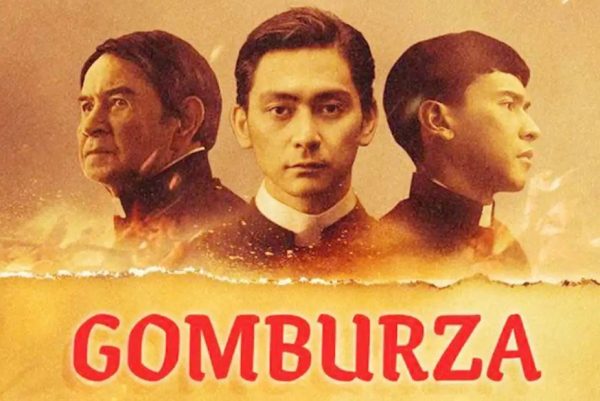Film on martyred priests makes waves in the Philippines
January 5, 2024 · By Ronald O. Reyes for www.ucanews.com

A poster of the film GomBurza. (Photo: Journal News Online)
Film on martyred priests makes waves in the Philippines
Thousands in Catholic-majority Philippines have continued to flock to theaters to watch an award-winning film on three priests executed by the Spanish colonizers in the 19th century.
Released nationwide on Christmas Day, the historical biopic GomBurZa retells the story of three native Filipino priests – Mariano Gomez, 72; Jose Apolonio Burgos, 35; and Jacinto Zamora, 36. The film’s title refers to a portmanteau of the three priests’ surnames.
They were executed on the orders of the Spanish colonial authorities on charges of subversion and treason on Feb. 17, 1872, for alleged involvement in the Cavite mutiny in January of that year.
Produced by Jesuit Communications, MQuest Ventures and CMB Film Services, the movie has already received awards in several film festivals including in the 49th Metro Manila Film Festival on Dec. 28.
Jon Ivan Torreros, 19, a communications student, said he was so excited about the film that he joined his friend to flock to a local theater in Tacloban City of the central Philippines.
“I have known GomBurZa since I was in elementary school, but it was only about their death. Now that I am in college, I learned that they are one of the biggest reasons why the Filipinos made sure of their independence,” he said.
“So they were the driving force… especially since they were also the reason for the awakening of the nationalism of Dr. Jose Rizal,” Torreros added.
Rizal is hailed as a national hero in the Philippines. He was executed on Dec. 30, 1896, at the same place where GomBurZa were executed.
Rizal’s execution sparked a massive revolution against the Spanish colonial government, which ruled the country from 1565 to 1898.
“I also saw the reviews from historians who approved this film,” Torreros said.
Bishop Pablo Virgilio David of Kalookan, the president of the Catholic Bishops’ Conference of the Philippines, urged Filipinos to watch the film.
“It is a well-researched historical film that will bring you back to the first spark of patriotism that forged the ‘Filipino’ identity that eventually united us Tagalogs, Kapampangans, Ilocanos, Cebuanos, natives, mestizos, criollos and all other inhabitants of these 7,000 plus islands into one nation in the last quarter of the 19th century,” the bishop said in a statement.
David said that watching the film “will make you appreciate what it truly means to be a Filipino.”
Filipino journalist Howie Severino said the film “is an epic reminder of our cinematic history.”
“Gomburza is among the most hallowed words in Philippine history… There is some general awareness of their relationship to what came after them — an inspired Jose Rizal and the rise of a Filipino consciousness that led to the revolution of 1896,” Severino wrote on Facebook on Jan. 2.
According to Severino, “A critical incident in the film was the classroom rebellion against the Latin medium of instruction imposed inside the university. Signifying language as a tool for both controlling and liberating the mind, it evokes similar debates today about using mother tongues in schools.”
During the Metro Manila Film Festival, the film received multiple awards including Best Actor, Best Director, Second Best Picture, Best Cinematography, Best Production Design, Best Sound Design, and the special Gatpuno Antonio Villegas Cultural Award.






